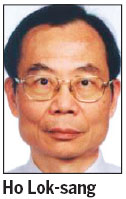Rethink of pros and cons of Direct Subsidy Scheme schools
Updated: 2013-07-03 05:40
By Ho Lok-Sang(HK Edition)
|
|||||||||
Like most things, the Direct Subsidy Scheme (DSS) for schools brings benefits and costs. Whether the benefits or the costs are bigger will determine whether they should continue. Moreover, if direct subsidy schools benefit mainly from greater autonomy over education matters, perhaps we should consider giving schools greater autonomy across the board.
Apart from greater autonomy over educational matters, the scheme can also charge additional fees. With the additional resources that parents contribute, the quality of education can be further enhanced. Since DSS schools are required to put aside some money to set up scholarships or free places, families who cannot afford the tuition fees may still have a chance to get the benefit of higher quality education for their children.
Opponents of the scheme argue that it mainly benefits those who are already more fortunate and wealthier. Although some free places are made available, the chances of children from a humble background getting into a DSS school are much lower. Therefore, this increases the disparity between the haves and the have-nots.

The crucial difference between DSS schools and other schools that receive funding from the government is that schools under the scheme have control over whom to admit. Non-DSS schools, on the other hand, must take all students assigned to them by the government. DSS schools, therefore, need to compete for students. If they fail to attract quality students, they are doomed. If they fail to attract the best students, they run the risk of not having enough students. If they have to admit students who eventually perform badly in public examinations, very soon they may not be able to draw enough students.
Because the traditionally prestigious schools will never have to worry about not being able to attract students, they have a huge incentive to turn into a DSS school. This is just human nature. For these schools, there will always be a huge number of students seeking admission. They can choose the best among the applicants. Together with the additional fees they charge, over the long run, they will beat those who continue to take students who are centrally allocated and have less resources.
Thus, we can see that more and more of the traditionally prestigious schools have opted for DSS status. In so doing, they have become truly elite schools, offering places mostly to students with a strong family background, high-income parents who are successful businessmen or professionals, and who are more likely to be able to afford extra support at home. DSS schools are reinforcing the perception that there's a privileged class whose children will continue to be privileged. This is not the way to bring about a harmonious society.
Actually, there is a strange inconsistency in the government's withdrawal of all subsidies from English School Foundation (ESF) schools, and the continuation of the DSS policy in Hong Kong. The traditional funding of ESF schools is actually quite similar to that of DSS schools. Both ESF and DSS schools charge parents additional fees while receiving government subsidies according to the number of students enrolled. Both ESF and DSS schools, moreover, can set up their own admission policies and will not be assigned students through the central student allocation system.
As it happens, if the reasons against government subsidizing ESF are valid, the same reasons would equally apply to DSS schools. From Wikipedia, the objections against subsidizing ESF schools include:
1. Other international schools are not subsidized, so it's not fair that the ESF should be subsidized.
2. The subvention allows the ESF to charge lower fees and pay higher salaries to teachers than other international schools. This creates unfair competition.
3. Most students in ESF schools could attend other schools and so do not need a government subsidy.
4. The ESF has been criticized for its governance and extravagance, which has caused many to question whether the public's money is being used correctly.
We can easily apply the same arguments to DSS schools. Thus:
1. Many schools are not subsidized, so it's not fair that DSS schools should be subsidized.
2. The subvention allows DSS schools to charge lower fees and pay higher salaries to teachers than international schools. This creates unfair competition.
3. Most students in DSS schools could attend other schools and so do not need a government subsidy.
4. Many DSS schools have been criticized for poor governance and extravagance, which has caused many to question whether public money is being used correctly.
Some might object that, predominantly, those schools that are not subsidized are international schools. Virtually all of the local schools are subsidized. But why should international schools be singled out to be ineligible for government subsidies? Although some people have huge incomes and can afford very expensive schools, there are many others who do not speak Cantonese and who cannot afford to pay such fees.
If ESF and DSS schools are intended to offer additional choices to parents and students with modest means, certainly their fees should be regulated to ensure that the fees are affordable. If greater autonomy over the school curriculum is the main reason why schools opt for DSS, is it not time to consider giving all schools the same autonomy?
The author is director of the Center for Public Policy Studies, Lingnan University.
(HK Edition 07/03/2013 page7)